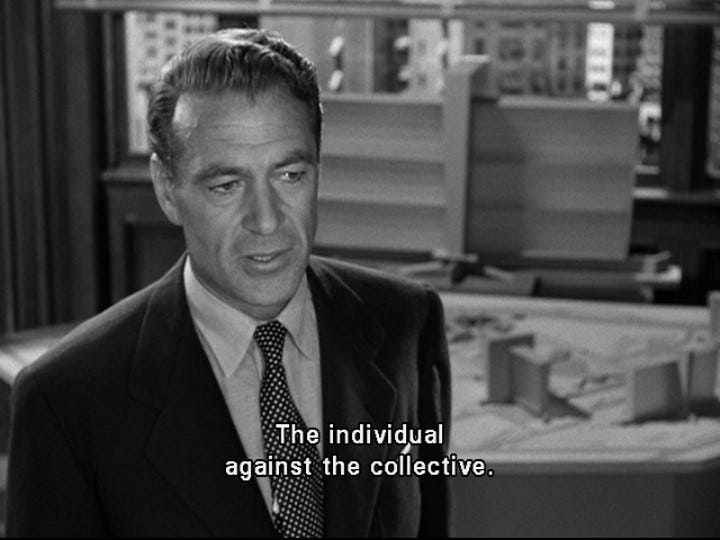Rand the Intuitionist
Last week I saw the debate between my co-author Ilya Somin of the GMU Law School, and Will Thomas from the Atlas Society. The topic: Are there conflicts of interest between rational people? If you’re inclined to respond, “Of course. So what?,” the answer is: A great deal… if, like Objectivists, you’re both an ethical egoist and a rights-based libertarian. How can you always do whatever best promotes your rational self-interest, and consistently respect the rights of others? Only if violating the rights of others never promotes your rational self-interest.
Will Thomas began his statement by biting the bullet: There are no conflicts of interest between rational people. Somin presented the obvious counter-examples. By the end of the debate, Thomas seemingly revised his original position to read: There are no fundamental conflicts of interest between rational people under normal circumstances. (Somin properly objected that what Thomas calls “normal circumstances” are historically and globally abnormal!) In the Q&A, I suggested it would be clearer to simply say: There are few major conflicts of interest between rational people, but I don’t think I convinced Thomas to adopt my formulation.
The solid core of Thomas’ position is just basic economics as taught by Frederic Bastiat and Julian Simon: the mutual gains to trade, the social value of production, the human mind as the ultimate resource. But of course this only gets you to “few major conflicts of interest,” not “none.”
To cement his case, though, Thomas resorted to an argument bad enough to make almost every economist and logician on earth scoff: It’s in your interest to respect others’ rights because it is in your interest to live in a rights-respecting society. There are few balder examples of the fallacy of composition. One could just as easily claim, “It’s in your interest to remain seated at concerts because it is in your interest for concert-goers to remain seated.”
The most striking thing about the debate: It illustrated the conflict between Ayn Rand’s often absurd official arguments, and her frequently persuasive unofficial arguments. Officially, Rand tells you to respect others’ rights because there are no conflicts of interest between rational people. Say what? But when Hank Rearden stands up for his rights in Atlas Shrugged, he discusses the harmony of interests only to deny its relevance:
I could say to you that you do not serve the public good – that nobody’s good can be achieved at the price of human sacrifices – that when you violate the rights of one man, you have violated the right of all, and a public of rightless creatures is doomed to destruction. I could say to you that you will and can achieve nothing but universal devastation – as any looter must, when he runs out of victims. I could say it, but I won’t. It is not your particular policy that I challenge, but your moral premise. [emphasis mine]
Instead, Rearden says something compelling enough to make coercive altruists doubt themselves:
If it were true that men could achieve their good by means of turning some men into sacrificial animals, and I were asked to immolate myself for the sake of creatures who wanted to survive at the price of my blood, if I were asked to serve the interests of society apart from, above and against my own – I would refuse. I would reject it as the most contemptible evil, I would fight it with every power I possess, I would fight the whole of mankind, if one minute were all I could last before I were murdered, I would fight in the full confidence of the justice of my battle and of a living being’s right to exist. Let there be no misunderstanding about me. If it is now the belief of my fellow men, who call themselves the public, that their good requires victims, then say: The public good be damned, I will have no part of it!
Passages like this tempt me to write a whole essay on “Rand the Intuitionist.” Her moral proofs were feeble, but her moral insight was often razor sharp.
The post appeared first on Econlib.



The link to the debate is no longer working unfortunately. Do you know if there is another copy of it anywhere? Sounds very interesting.
A prudential analysis can’t rule out the possibility that in an emergency, the best (perhaps all) solutions may violate someone's rights. But the right which is absolute is the victims' right to dispute this, and to demand restitution after the fact at least. Then, if the solution is really an improvement, everyone can be reconciled. The victims can waive their rights ex post, or receive compensation.
This has problems in practice. Two jump out at me. One is the difficulty of getting agreement on the simple facts of the case. The other is that it calls upon the arbitrator to do something like determine the “just price” of the violation. So even if I convince you that the principle is valid, there is no way to implement it perfectly.
But that could be said about the tort system, and what can we do about it? I see it as a choice, we can either think rights are variable during emergencies, or we can think that they are not, even if the emergency necessitates violating them somehow.
I am not really happy with this solution, it just seems better than the two other options.
Just to be clear and out a final rhetorical spin on it, the options seem to be
1) never violate rights, no matter what.
2) violate rights whenever there is a good reason, no need for restitution.
3) violate rights in emergencies, only if accepting liability for restitution of the victims.
J.C. Lester has a rather complicated explanation (too long to include here) how, for example, property owners no longer have the right to exclude trespassers during a natural disaster. I’m not sure whether that is 2 or a separate option.